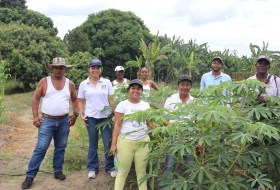News
The Stockholm Environment Institute (SEI) highlights the work of the BIOECONOMY Program.
The program led by the University of Cauca aims to generate strategies for optimizing participatively the cassava value chain in Colombia through co-innovation in primary production, circularity in transformation, and access to markets with sustainability and competitiveness criteria.
The program "Strengthening the Cassava Value Chain in Colombia through Co-innovation in Primary Production, Transformation, and Market Access with Criteria of Sustainability, Competitiveness, and Circular Economy" is an initiative funded by MINCIENCIAS, led by the University of Cauca in partnership with SEI, Essentia, Agrosavia, University of Areandina, Clayuca, Canal del Dique Foundation, University of Córdoba, and Poltec.
The project aims to generate strategies to optimally enhance the cassava value chain in Colombia through co-innovation in primary production, circularity in transformation, and market access with criteria focusing on sustainability and competitiveness, thereby increasing income for producers and creating employment in the region. It is being implemented across the departments of Bolívar, Cauca, Córdoba, Sucre, Valle, Meta, Cesar, and Magdalena, and is aligned with various local, national (Bioplastics Cluster), and international (Circular Economy of Bioplastics in the Americas - CPAB) programs.
The Stockholm Environment Institute (SEI) presented a documentary aiming to raise awareness and promote the cultivation of cassava in the country. It highlights the research work conducted in collaboration with allied entities, along with different organizations and companies focusing on innovations in this agricultural commodity, investigating the profound transformations occurring in the regions.
According to SEI, innovation and sustainability intertwine in endless possibilities with a crop like cassava, emerging unexpectedly as a protagonist in Colombia's path towards the bioeconomy. This root, essential for the food security of over 500 million people globally, is poised to lead Colombia in bioeconomy and bioplastics production.

Photo: Communications CYTBIA
The idea of converting cassava into bioplastics may sound like science fiction, but it is a testament to the ingenuity and collaborative work of researchers, innovators, and visionaries at the University of Cauca. Through its CYTBIA research group, the university has become a crucial player in the country, transcending borders with such research initiatives.
The knowledge transfer for bioplastics production from industrial cassava starch to Esenttia, a company producing petroleum-derived plastics, exemplifies the convergence of academic research and industrial innovation. This bold collaboration not only advances bioplastics production but also demonstrates cassava's pivotal role in transforming Colombia's industry and economy.

Photo: Communications CYTBIA
"In addition to bioplastics, SEI's study highlights cassava's potential for animal feed and gluten-free food production from sweet cassava flour. The report emphasizes the importance of ensuring competitiveness and environmental, social, and economic sustainability across the entire value chain, a crucial step towards the bioeconomy," commented Héctor Samuel Villada, Director of the CYTBIA research group at the University of Cauca and Director of the BIOECONOMY Program.
"The country should invest in bioplastics not only for regulatory reasons but also because developing this industry directly contributes to energy transition goals and promotes a closed-loop plastic cycle starting from agricultural raw materials, returning to farmers through composting, as we are doing at Esenttia with bitter cassava and other industry residues.

Above all, to ensure that companies currently involved in plastic commercialization can transition to a more sustainable market," added Manuel Leyva, Vice President of Growth at Esenttia.
Thus, the University of Cauca continues to invest in strengthening research processes aimed at positively transforming the lives of rural communities in the Cauca department, promoting the synergy between academia, government, industry, and society. It contributes to transforming productive processes envisioned by different communities and producer organizations towards a circular, sustainable, and environmentally-friendly market.
For more information:
BIOECONOMY Program


